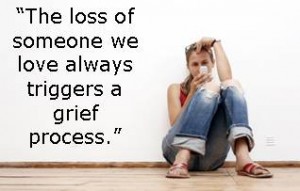The Oxford English Dictionary[1] defines grief as “deep or violent sorrow, keen regret”. However, in our lives strict definitions rarely apply. Grief can take on many forms and is often unpredictable in its presentation.
The loss of someone we love always triggers a grief process. Our reactions to grief are influenced by many factors, including the experience itself, our background, our personality, the importance of the loss to us and the support we receive from family and friends.
The initial period of sadness and sense of loss may be intense and overwhelming, but it gradually becomes less so. The immediate stages of grief can take from six weeks to three months, and although some people complete their grieving process in one or two years, many are still grieving acutely several years later.
An aspect of grief that is often missed is that it doesn’t only present itself as a result of a death. It isn’t only death we need to grieve – it’s life, loss of hopes and dreams and even change.
Grief is a complicated and misunderstood state. Yet it is something that, unfortunately, we must all experience at some point. Grief is many things, including an emotional response to loss. The underlying basic emotions for grief are anger and sadness. However, unlike the normal transitory emotions, grief can be more like a mood that remains for a period of time. More than any other emotions – the combined feelings that make up grief are capable of clutching at us and holding on.
Grief can be felt on a physical, mental, emotional and spiritual level. The grief process generally follows a series of stages through which we move in a varied way. The ultimate goal is the acceptance of the loss.

There are a number of reasons to explain the way we respond to a pregnancy loss. Many studies have spent time researching patterns of responses associated with miscarriage grief and while it is of interest to read and understand the conclusions that these studies offer, it is important that we all acknowledge our right to respond in the way that feels natural for us. People choose to behave in many different ways when confronted with the grief of pregnancy loss.
It’s worth remembering that miscarriage grief isn’t a contest and doesn’t have to be put on a scale of severity to be valid. It’s always okay to grieve the loss of a pregnancy, even if the pregnancy had only just begun. Every experience is unique and it just isn’t possible (or necessary) to compare one loss to another. All of our feelings are valid. There isn’t a scale for grief in pregnancy loss.
Take care until next time
Helen


